- Home
- Jim Thompson
King Blood Page 10
King Blood Read online
Page 10
A strong draft swept through it: their window was open, and a morning breeze was sweeping across the room, sweeping the room's sounds before it to the tensely listening Joshie.
She could hear everything as clearly as though she were in the room with Kay and Arlie. But all she could hear for a time was the measured creaking of the bed, and the quickening tumult of copulation to climax.
Then, after a period of contented quiet...
Arlie withdrew from his wife's full body; flopped down on his back at her side. "Now, by God," he declared, "that's what I call a prime piece of meat! The more I get, the better it gets."
Kay giggled, pleasedly, then suddenly made herself silent and drew slightly away from him. Arlie asked what the hell was the matter with her. Kay said there was no point in telling him. After all, she was only his wife, and a person of no consequence. Arlie let out a groan.
"Now, God damn it, ol' squaw—!"
"See? What I tell you?" Kay demanded. "I tell you something for your own good, an'—"
"Well, I ain't gonna tell you nothing for your own good," Arlie asserted. "I'm gonna 'do' something! Just one more God damned word out of you about Critch, an' I'm—"
"Hokay, hokay," Kay shrugged. "I 'not' say one more God damn word. But by God, maybe some day you wish I had, I betcha."
Arlie said, "Oh, shit!" very loudly. There was a considerable silence after this, as Kay assumed an attitude of haughty hurt. At last, Arlie gave one of her breasts an affectionate pinch, and asked her why such a pretty little squaw had to be such a big horse's ass.
"I'm tellin' you, honey. I've said it before an' I'll say it again. Ol' Critch, he couldn't kill a baby chigger if it was chewin' his dong off."
"Ho!" sniffed Kay. "So you say, an I say how come? He a King, ain't he? You kill, ol' Boz kill, ol' Uncle Ike kill. All Kings plenty mean sonsabitches. All killers. So how come not Critch?"
Arlie wet his lips hesitantly. "I don't know why," he admitted. "But I still know it. Maybe he got away from here young enough, so's he growed up different. Anyways, it just ain't in him t'kill no one."
"Then, how he get all that money? You t'ink maybe some one jus' give it to him?"
"God damn it, don't you listen to nothin' I say? I told you Critch wasn't a killer. Which don't mean that he ain't the smoothest, sneakiest, crookedest son-of-a-bitch that ever come down the pike."
"So he crooks somebody for money. Beeg, beeg money like U.S. treasury department, an ol' Critch he get it. Fool people plenty."
"That's for sure, ol' squaw."
"Critch plenty good foolin' people. Maybe so he fool you."
"Oh, for shit's sake—!" Arlie slapped his forehead. "I'll tell you who he fooled! Some God damn stupid woman like you!"
The outburst was purely retaliatory, its substance mere irritation. Not until the words were out of his mouth, did he consider their portent; that what he had said in thoughtless anger was quite likely true.
'By God, it made sense, didn't it? Lacking the guts to kill, Critch would logically choose women to victimize. He had screwed some woman for the seventy-two thousand; doubtless screwed her literally as well as figuratively.'
What woman would be carrying so much cash? Why hadn't she appealed to the law, thus making Critch a wanted man—which he definitely was not?
The answer came to Arlie almost simultaneously with the question. The woman hadn't kicked because she couldn't. She was wanted herself. And...
'Those Anderson sisters! Critch had almost stared a hole in the wanted posters on them. Looked at "em so long that Marshal Thompson had been half-way suspicious. And ol' Critch had covered up pretty well, being such a smooth, sneaky bastard. But still—'
Had Critch swindled both of the sisters or only one? How had he, no killer, managed to rob a woman (or women) who killed for a living?
"...well. 'Well?"' Kay's voice cut in on his thoughts. "You answer me, ol' Arlie!"
Arlie yawned elaborately, mumbled that he must have dozed off for a minute. "What the hell you jabberin' about now?"
"I say," repeated Kay firmly, "that everyone kill sometime, "bout something, even ol' Critch. Right now, he t'ink maybe he get money back, so he don't do nothin'. But he find out money gone, 'zzzzt,' you be dead, ol' husband."
Arlie groaned. Silently cursed himself for telling her about the money, and deciding to be very cautious in confiding in her henceforth.
"Ol' Uncle Ike, he like Critch better'n you. Maybe so some day Critch own ranch, an' you be up shit creek."
Arlie grunted that she had obviously been up the creek herself and swallowed too much of its contents. "Critch is just someone new for Paw to talk to, an' he ain't seen Critch since he was a kid. Soon as the newness wears off he'll be just as rough on Critch as he is on everyone."
"Ho," said Kay.
"Ho, ho!" said Arlie.
"Ol' Uncle Ike, he buys skinny cigars Critch like. He buy special extra fine whiskey Critch like. An' all the time, he make talk with Critch. Ol' Uncle Ike, he say, Arlie, go do this, do that; I will talk with Critch."
"But God damn it, I just got through telling you—! I mean, uh, if you didn't keep your jaw goin' all the time like the clatter-bone in a duck's ass, an' I ever got a chance to think—!"
Kay turned on her side, pulled his head against her breast and gave him a motherly caress. She kissed him gently, softly stroking his hair; holding him protectively close. Of course, he should think, she said; and whatever he thought would be right, because he was her ol' Arlie an' he always knew what was best.
Arlie sighed, a mixture of contentment and protest. "I thought you'd changed your mind about Critch. Thought you had him tabbed for Joshie's man."
"Did," admitted Kay. "But that before I see danger. Mus' take care of husband first. Ol' Joshie, she do same thing with Critch. Ol' Boz no God damn good or she take care of him, too."
Arlie hesitated.
"Well," he said. "I guess there's no hell of a big hurry about Critch. Nothin' I got to rush into."
"You no think so, Arlie? My ver', ver' smart ol' husband he really think there no hurry?"
There was an insidiously incredulous note to her voice; a note of stunned astonishment. Thus, a mother might address an adult son who has just wet his Sunday britches.
"Well, but, looky," Arlie squirmed. "Marshal Thompson already put me on warning, an' he damn well meant what he said. I go for Critch, Marshal Thompson gonna be comin' for me!"
"Maybe so Critch have accident," Kay suggested smoothly. "Critch have accident not your fault."
"Well," Arlie said. "Well..."
"My ol' Arlie, he plenty sneaky devil," Kay said flatteringly. "He fix up plenty bad accident on ol' Critch, an' nobody prove it not accident. I know, by God!"
She kissed him again. Resumed her hypnotic stroking of his head. But Arlie was not yet won over. Or if he was, he did not say so.
He flung back the covers suddenly, and swung his feet to the floor.
"Time to get up," he announced. "Pile out, ol' squaw."
He stood up, began pulling on his clothes.
Outside the door, Joshie also stood up and silently returned to her room.
In his room, Critch King also began dressing; now and then wincing or stifling a groan as his movements twisted some saddle-tortured muscle or joint. His first week had been pure murder for him. Every day he had silently sworn that he could not take another day. Every morning it had been a monumental struggle to get out of bed, and he had had to fight to keep from begging off for the day. He had mustered up the strength and courage to resist such an admission of weakness only because he had to. For despite the surprising amiability—even favoritism—which his father had shown toward him, he well knew Old Ike's detestation of weakness. Ike simply would not tolerate it in a son, any more than he would have tolerated improvidence. And since Critch had to remain at the Junction, at least until he recovered his stolen money, and he could only remain there by living up to the old man's standards—well, somehow he
had done it. He had never thought he could, but he had. And now, after three weeks, what had once seemed unbearable was now merely difficult, and less and less difficult with each passing day.
In the flickering light of the kerosene lamp, he studied himself in the dresser mirror; felt a kind of abashed pride at the change in his appearance. The normal olive pallor of his face had given way to heavy tan. He had gained weight; even his shoulders appeared to have broadened. His clothes, garments virtually identical with those worn by Tepaha, Arlie and Ike, now fitted him snugly whereas they had originally seemed to hang on him.
He glanced down at his hands, grinned sourly at their appearance. They were calloused, stiff, the nails torn and stubby. But, never mind. Money and time would take care of such trifles. He would have the first and hence the last as soon as he had evened the score with Arlie. For the time being, he must move slowly. Giving Arlie time to become unwary and let his guard down; working to ingratiate himself even further with Old Ike; getting into the good graces of everyone who might later prove useful to him.
All he had to do was what he had been doing. Work—and wait for opportunity to reveal itself. And for seventy-two thousand dollars he was prepared to work and wait indefinitely.
Critch finished dressing, putting the final touch to his costume by tucking a knife into his boot-top. The knife was expected of him, and he was doing what was expected. Also, he had been practising with it at night. Shadow-fighting before the mirror until he was too exhausted to make another feint.
It could come in very handy some day. He just might give Brother Arlie the surprise of a lifetime.
Taking a final look at himself, Critch lounged near the door, waiting for the sound of the others emerging from their rooms. Meanwhile, speculating on just where Arlie had hidden the money.
He was confident that Arlie had not left it in El Reno, but had brought it back to the ranch with him. For once, on the return trip to the Junction, Arlie had left him alone in their stateroom for a few moments, and Critch had seized the opportunity to search his brother's carpetbag. And buried at the bottom of it, beneath several articles of clothing, was a heavy steel box.
It was a brand-new box, with the El Reno merchant's price tag still on it. Shaking it, Critch had heard a telltale rustling, a softish series of thuds from within. He was debating what to do—whether to take the box and risk leaping from the window—when he heard Arlie at the door. So he had hastily jammed the receptacle back where he had gotten it, and reclosed the carpetbag. And that had been his last chance to recover the money.
For the rest of their ride, Arlie had ridden with his feet on the bag, or taken it with him whenever he left the stateroom.
Now, Critch heard familiar sounds in the hallway, and he stepped out into it. He said good-morning to Arlie, nodded at Kay and gave a warm smile to Joshie. Then, the four of them started down the stairs, Arlie and Critch in front, Kay walking behind her husband and Joshie behind Critch.
They were nearing the foot of the staircase when there was a scurrying scuffle, an angrily sibilant whispering from the two girls. Arlie whirled around, gave each a long slow look. But their round dolls' faces with the preternaturally widened eyes were prim masks of innocence. So the descent continued, and the foursome continued on into the bar where Tepaha and Ike awaited them.
Drinks were poured for the men, Critch's from a special bottle which Arlie stared at meaningfully. They toasted each other silently, tossed down the liquor at a gulp; thudded their glasses back to the table. Old Ike hoisted himself up from his chair, turned to lead the way into the dining room. And Kay suddenly let out a yell.
'"Ouch!' God damn, plenty ouch, by God!"
Simultaneously, she began to hop about on one moccasined foot, clutching the other in her hands.
Tepaha leaped forward. Grabbing her shoulders, he gave her a vigorous shake; demanded the reason for her outrageous breach of decorum.
"Speak, witless girl! Stop dancing like crazy chicken and explain, or I slap you loose from pants!"
Kay gingerly lowered her foot to the floor, looked murderously at her sister.
"Ol' Joshie stamp on my foot, Grandfather. Hurt like hell."
"So!" said Tepaha, turning ominously to Joshie. "Did you stamp on your sister's foot? 'Did you?"'
Joshie nodded nervously, sullenly, adding that Kay had invited the attack.
"Ol' Kay say mean things, Grandfather Tepaha. I try to make her stop, but she keep on."
"That is no excuse," Tepaha declared sternly. "One wrong does not right another." He hesitated, one hand drawn back. "What were these mean things?"
"Well—" Joshie fidgeted, her eyes downcast. "She say—she say—"
"Speak quickly, foolish child!"
"S-she say...she—" Joshie's voice suddenly strengthened, blurting out the words. "She say I want ol' Critch to fock my possy! She say my possy no good, so he no fock me!"
Tepaha blinked, let out a stunned grunt. He looked at Ike, a look that silently appealed for help. But his old friend had averted his eyes, and was convulsed by a spasm of coughing.
Helplessly, Tepaha shifted his gaze back to Joshie. "Such words are spoken only between man and woman," he said. "Privately. You will have to be punished."
His arm arced for a slap. Critch spoke up quickly.
"Pardon me, Grandfather, but Kay spoke the words first. Joshie only repeated them at your request."
"Well—" Tepaha hesitated; nodded. "You speak truth, Critch. Stand forward, Kay."
"Now, just a God damn minute!" Arlie snapped. "What about Joshie stomping on Kay's foot? What about that, huh? And'—glaring at Critch. "Just where the hell you get off buttin' into this? You got nothin' to say about Kay or Joshie neither! She ain't your squaw."
"Now, Arlie," Critch said mildly. "After all, fair is fair—"
"Fair is shit! If Kay gets slapped, then by God Joshie gets it! It's both of "em or neither!"
Tepaha's face hardened. Arlie put a protective arm around Kay, and Joshie moved closer to Critch. Silence fell over the room as one stubborn glare locked with another. Then, old Ike found his voice, declared firmly that the matter was to be dropped.
"Not another God damn word out o' no one, or by God I'll do a hell of a lot more than slap! Now, they's work to be done an' breakfast t'be et before, so let's get at it."
He led the way into the dining room.
Tepaha stalked behind him, after a stern glare at the four young people.
Arlie followed, followed by his wife. Critch, trailed by Joshie, entered last. As, of course, was proper for the youngest son.
The meal was a huge one, consisting mainly of meat: steak, pork chops and ribs, slices of venison roast. Along with the meat, there were eggs, cracked-corn porridge, stewed dried fruit, biscuits, cornbread and buckwheat cakes. There was milk also—canned milk. As on many ranches, even today, all effort was concentrated on the production of beef. A cow's milk went to suckle her calf, without a drop's diversion to human beings.
The meal was cooked, and also served, by squaws; kinswomen, by blood or marriage, to the workmen in the Junction's several business establishments: the blacksmith shop, the feed and grain store, and the general store.
There was virtually no talk at the table, everyone emulating Ike and Tepaha in disposing of as much food as possible in the time allotted for breakfast. Critch had failed to do this, in the beginning; fastidiously picking at his food, and feeling a little ill at the gorging of the others. The result was that he had almost collapsed from weakness in midmorning. And by the time the sun was directly overhead, signalling the lunch hour, he had toppled rather than climbed down from his saddle.
At last, Old Ike glanced at his turnip-like watch, belched heavily, and shoved back his plate. Tepaha also belched and leaned back from the table. In short, the meal was over.
Ike caught Arlie's eye, and nodded to him. "You an' Kay go saddle up. You're gettin' a late start this mornin'."
"Me an' Kay again, huh?" Arlie sco
wled. "How come it ain't never Critch and Joshie."
Ike ignored him, turning to Joshie. "Go bring Critch's bottle, an' some of his seegars. We got talk to make."
Joshie said, "Yes, Old Uncle," and scurried away, giving her sister a triumphant sneer. Still ignoring Arlie, Ike spoke to Critch: How did Critch feel about ranch work by now? Was everyone treatin' him all right? Was there anything he needed? Critch murmured appropriate replies, nervously aware of his brother's displeasure. Arlie flung back his chair suddenly. He stamped out of the room, moving so fast that Kay was forced to run to keep up with him.
"So everything's goin' all right?" Ike asked, as Joshie poured after-breakfast drinks. "Any questions about the work or anythin'?"
"None so far," Critch smiled. "None, that is, that Arlie hasn't been able to answer."
"They's maybe plenty Arlie can learn from you. You figure he needs to know somethin', you speak up."
Critch nodded, without the slightest intention of carrying out his father's order. Arlie's hurt pride and huffiness must not be turned into anger. Moreover, he could hardly suggest improvements in a routine which, while arduous, was the essence of simplicity.
The day's work consisted of merely visiting the holdings of one Apache tenant after another. At each place, Arlie and Critch consulted with the head of the family, inquiring into his progress, taking note of his needs and offering such advice as seemed indicated. Meanwhile, Joshie and Kay performed much the same chore for the household's womenfolk.
"Lessee, now," Old Ike rumbled. "The four of you is still ridin' together, right? Maybe you ought to be splittin' up into twos, so's you could cover more ground."
"Well..." Critch hesitated. "If you think I'm ready..."
Ike said it wasn't what 'he' thought, but what Critch thought that mattered. "Make up your own mind," he added, hoisting his heavy body from his chair. "Now, you better be skedaddlin' out o' here."

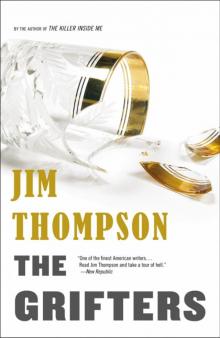 The Grifters
The Grifters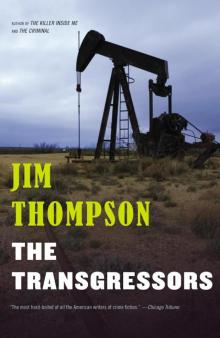 The Transgressors
The Transgressors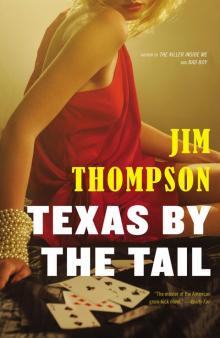 Texas by the Tail
Texas by the Tail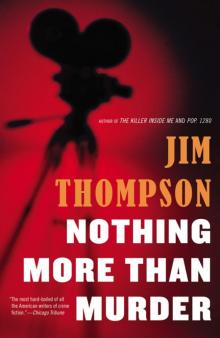 Nothing More Than Murder
Nothing More Than Murder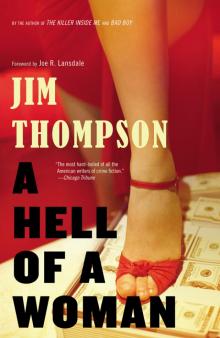 A Hell of a Woman
A Hell of a Woman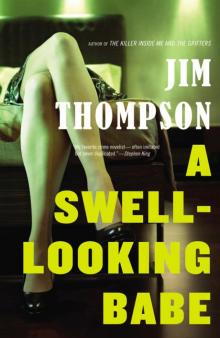 A Swell-Looking Babe
A Swell-Looking Babe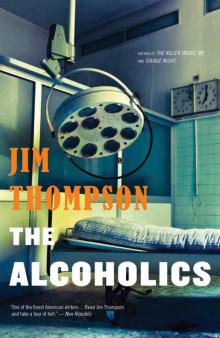 The Alcoholics
The Alcoholics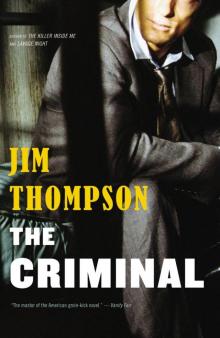 The Criminal
The Criminal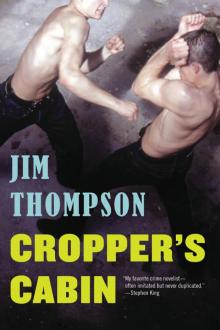 Cropper's Cabin
Cropper's Cabin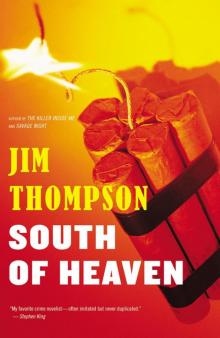 South of Heaven
South of Heaven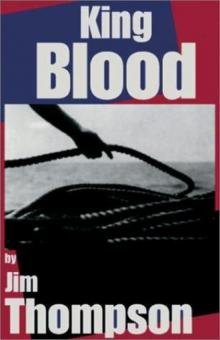 King Blood
King Blood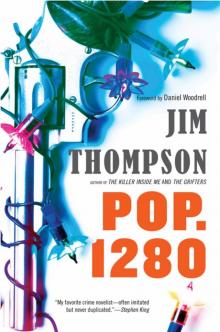 Pop. 1280
Pop. 1280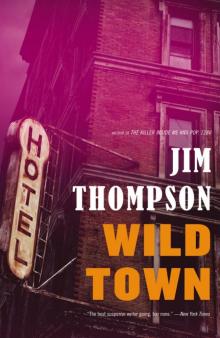 Wild Town
Wild Town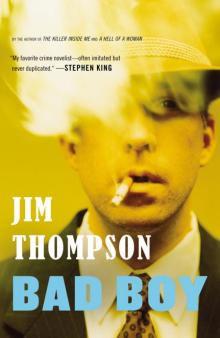 Bad Boy
Bad Boy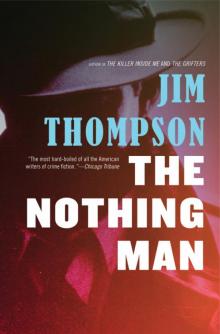 The Nothing Man
The Nothing Man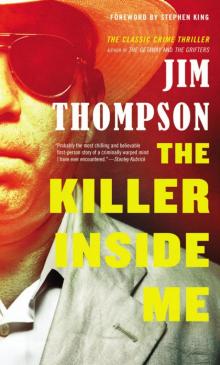 The Killer Inside Me
The Killer Inside Me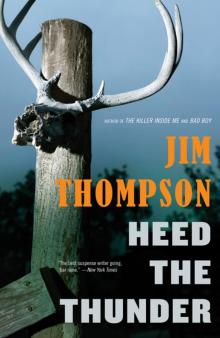 Heed the Thunder
Heed the Thunder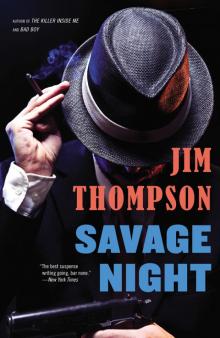 Savage Night
Savage Night Recoil
Recoil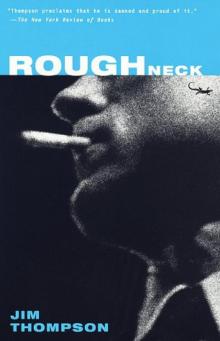 Roughneck
Roughneck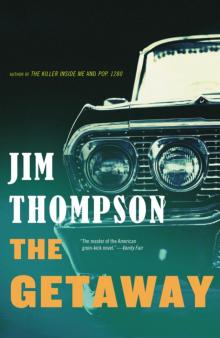 The Getaway
The Getaway